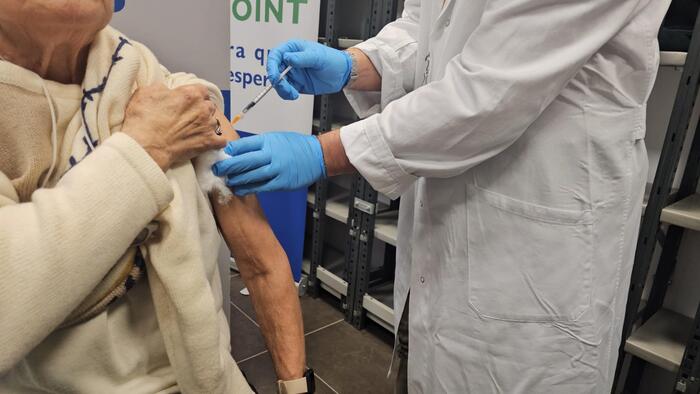A woman walks in an almost deserted street in London this Saturday.ANDY RAIN / EFE
The European Union began to shield itself against the United Kingdom on Sunday to try to stop the spread of a new strain of the coronavirus, more contagious, detected in the British Isles and to which the Government of Boris Johnson attributes the rebound in cases of covid-19 in his country.
The Dutch Executive of Mark Rutte was the first to ban flights from the UK, from December 20 to January 1.
Throughout the day, and until last night, up to thirteen countries had joined similar vetoes, including Germany, Italy, France (temporarily, for 48 hours).
The Government of Spain ruled out for the moment canceling flights and announced that it will reinforce the control of PCR tests verification in airports and ports for people arriving from the United Kingdom, while waiting for a common decision for all of Europe.
Given the notification of this new strain, the European Center for Disease Control (ECDC, for its acronym in English) has published a risk assessment this Sunday and accepts the estimates of the United Kingdom, which assure that it may be 70% more contagious.
“This new variant has emerged at a time of year in which the family and social mix has traditionally increased.
At this time, there are no signs of a greater severity of the infection, "he says in his report.
Urges countries to sequence the cases to detect if they correspond to this variant to alert the European early detection system and calls to avoid travel and non-essential social activities.
The recommendation comes four days before Christmas Eve, when most of the Spanish autonomous communities had already announced their Christmas plan.
The last was Extremadura, on the same Sunday, which, by exceeding the incidence of 250 cases per 100,000 inhabitants in 14 days, canceled the relaxation of the restrictions it had planned, although it will continue to allow 10 people to sit at the table on Christmas Eve and New Year's Eve as long as they are "Relatives, not close friends."
The president of the European Council, Charles Michel, called on Sunday an emergency meeting by videoconference between the permanent representatives of the countries in Brussels to take measures against this change.
There was an exchange of information on the measures that each country is going to adopt regarding the closure with the United Kingdom, the ban on flights or the obligation of PCR.
Coordination efforts will continue at another top-level meeting scheduled for Monday.
It is the same day that the European Medicines Agency is scheduled to approve the Pfizer vaccine.
The Spanish Government, which had requested the coordination of the member countries, was against taking unilateral decisions by the countries on Sunday.
Government sources explained that at this Monday's meeting they will insist with the rest of the European Union countries on "the need to adopt coordinated measures on flights from the United Kingdom", although one after another, up to 13 executives joined the restrictions throughout the day.
Spain is limited to strengthening the controls of the tests at origin, a measure that Fernando Simón himself, director of the Center for the Coordination of Health Alerts and Emergencies, has on several occasions considered little useful.
Meanwhile, the World Health Organization (WHO) asked its members in Europe to "tighten their controls," according to a spokesman for the agency's European affiliate to France Presse.
Elvis García, a doctor in Public Health from Harvard University, tells EL PAÍS that the Spanish Government should not wait to cancel flights with the United Kingdom and it seems insufficient to limit itself to requesting PCR tests.
"The problem with this new variant is that if it is confirmed that it is spreading more virulently, the third wave could be much worse than the second, since the Government has enlisted in 'saving Christmas' by making schedules more flexible and maintaining hospitality open.
If this alteration can teach us something, it is that the virus is ahead of us and if we do not take more drastic measures we will continue to slipstream, that is, we will have more deaths, "he says.
José Martínez Olmos, professor at the Andalusian School of Public Health, also points out that it is advisable to “exercise extreme caution”.
"The restrictive measures should be increased and seek whether or not this strain is circulating in the places where there is more interaction with the British: the Canary Islands, the Balearic Islands, the Valencian Community, Andalusia (Costa del Sol) and Gibraltar, as well as prohibiting flights," he adds.
In the same vein, Alberto Infante, doctor and emeritus professor of International Health at the National School of Health-Carlos III Health Institute of Madrid, who believes that it is necessary to examine how long has the United Kingdom known this variant.
“If it's been a few days, things have a pass.
If it has been for a week or more, then the negligence is serious ”, he points out.
The new variant of the coronavirus forced the United Kingdom to tighten restrictions in London and other areas in the south of the country.
This strain has already left the islands: a new contagion was detected in the Netherlands.
The Dutch Ministry of Health is now investigating the origin of the infection.
In light of the situation, the Government has banned passenger flights from the UK until January 1 and is currently investigating whether to extend the restrictions.
Then Austria, Germany, France, Bulgaria, Ireland, France - which will do so for the moment for 48 hours -, Latvia, Estonia, Luxembourg, Sweden, the Czech Republic and Italy joined.
Greece limited itself to announcing a quarantine to those arriving from the islands and, outside of Europe, Israel also announced a ban on flights.
The Italian Foreign Minister, Luigi Di Maio, announced the closure of his country to the United Kingdom on Twitter: “As a Government we have a duty to protect Italians and for that reason, after having notified the English Government, we are about to sign a measure with the Minister of Health to suspend flights with Great Britain.
Our priority is to protect Italy and our countrymen ”.
Waiting for agreement
The border lock opens a mystery about the EU health strategy, which during the second wave had managed to keep communications open between the Member States and avoid the chaos in passenger and freight transport experienced during the first wave.
For transport purposes, the UK remains a de facto member of the EU until December 31, so the ban on its flights and trains could herald an escalation of bans if the third wave precipitates or hits more virulently than the expected.
The isolation of the United Kingdom by plane, ship and train coincides with the final stretch of the negotiations on a trade agreement to avoid a drastic rupture on December 31, when the grace period agreed upon after the country's departure from the EU expires on January 31st.
The Johnson Executive thus runs into a perfect storm, caused by the final blow of Brexit and by the last blow of the SARS-Cov-2 virus.
Until now, in the absence of the resolution it takes at today's meeting, the European Commission has urged community partners to avoid as far as possible restrictions on movement that would aggravate the enormous economic impact of the pandemic.
The community body recommends that no passengers be prohibited from entering, not even those from areas classified as high risk for the spread of the virus.
Brussels believes that in those cases a test should be imposed upon entering the country or impose a quarantine.
The EU, on the other hand, remains closed to travelers from third countries, except in the case of visits considered essential or that come from the list of so-called safe countries, in which only a handful of countries appear at the moment (Australia, South Korea, Japan, New Zealand, Rwanda, Singapore and Thailand).
The United Kingdom, precisely, could become a third and unsafe country on January 1 (that is, with prohibited entry into the EU) if the negotiations underway in Brussels for a trade agreement do not come to fruition.
With information from
Carlos E. Cué, Isabel Ferrer
and
Enrique Müler
.
Information about the coronavirus
- Here you can follow the last hour on the evolution of the pandemic
- Restrictions search engine: What can I do in my municipality?
- This is how the coronavirus curve evolves in the world
- Download the tracking application for Spain
- Guide to action against the disease







